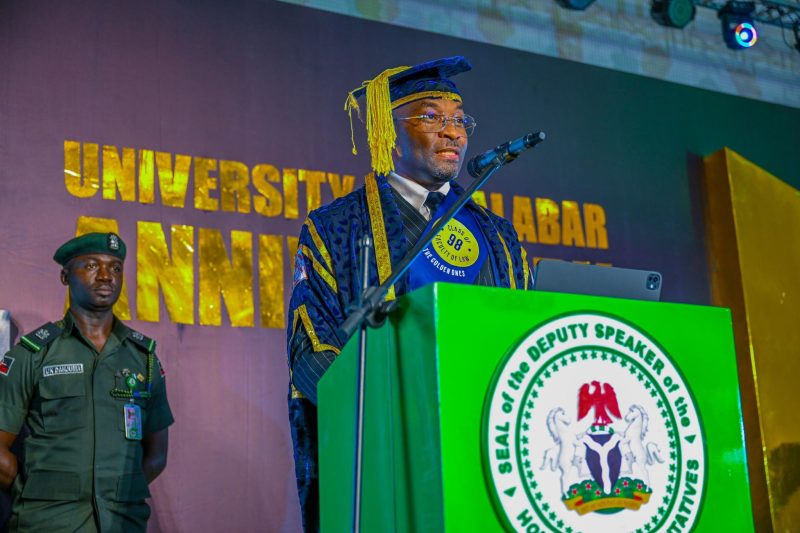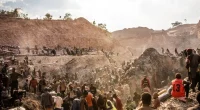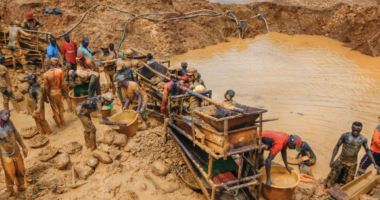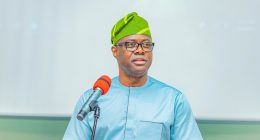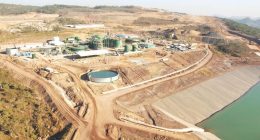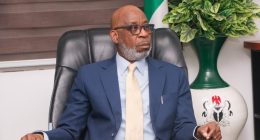At the 37th Convocation and 50th Anniversary Lecture of the University of Calabar, Deputy Speaker of the House of Representatives, Rt. Hon. Benjamin Okezie Kalu, delivered a powerful call to action for the mining sector, urging Nigerian universities to align their academic offerings with the country’s vast mineral wealth.
Titled “Our Gown in Town and in Cyberspace: Sustainable and Human-Centered Education, The Mandate of Our Universities, 2025–2075”, Kalu’s lecture, delivered on March 20, 2025, underscored the mining sector as a critical pillar of Nigeria’s untapped economic potential.
Mining: Nigeria’s Sleeping Giant
Kalu described Nigeria’s mining sector as a “gold mine,” lamenting its underutilisation despite the country’s abundant mineral deposits. He stressed that the development of this sector is vital to Nigeria’s industrial future and economic diversification.
“To build a truly prosperous nation, we must align our educational priorities with the resources that define our economic potential. One such opportunity lies beneath our feet. Nigeria is abundantly blessed with solid minerals, yet for decades, our education system has focused more on theoretical disciplines than on harnessing the country’s vast natural wealth,” he said.

He provided a detailed breakdown of Nigeria’s mineral geography:
• North Central: Tin, columbite, tantalite, and barite—critical to electronics and industrial applications.
• North West: Gold, granite, and limestone—vital for jewellery and construction.
• North East: Gypsum, kaolin, and bentonite—essential for cement and pharmaceuticals.
• South West: Bitumen, feldspar, and lithium—important for road construction and battery technologies.
• South East: Lead, zinc, coal, and oil & gas reserves.
• South South: Limestone, clay, and rare earth elements—largely unexplored.
Despite this natural endowment, Kalu pointed out, Nigeria continues to import refined mineral products and struggles to industrialise the sector.
“The mining sector, despite its vast potential, contributed only 0.3% to Nigeria’s GDP in Q3 2022, according to KPMG—an increase from the 0.2% recorded in Q3 2021, but still far below its capacity to drive economic transformation. The gap between what we have and what we gain from it highlights a crucial flaw in our educational system.”
He criticised the scarcity of mining faculties and research into mineral processing, value addition, and sustainable practices, calling on universities to take responsibility.
“Few universities dedicate faculties to mining, mineral processing, or extractive metallurgy. Research into value addition, refining, and sustainable mining practices remains minimal. If our goal is to make education in 2075 more impactful and productivity-driven, then it must align with the needs of the nation, ensuring that the abundant resources beneath our feet become a catalyst for industrialization and economic prosperity.”
Commendation and Policy Shifts
Kalu praised President Bola Ahmed Tinubu’s administration and the Minister of Solid Minerals Development, Dr. Dele Alake, for their efforts in repositioning the sector, highlighting recent policy reforms.
“This administration has made commendable strides in repositioning the mining sector. The amendment of mining laws has created a more attractive environment for investment and responsible exploration. The establishment of the Nigerian Mining Commission ensures regulatory compliance and strategic mineral development, while the recently launched Mining Fund is set to support small-scale miners and encourage local value addition. These policy changes will remain mere documents, however, unless we develop the necessary human capital to drive them.”
Learning from Global Models
Drawing inspiration from countries like Germany and China, Kalu advocated for Nigeria to embed mining into its educational strategy.
“Countries like China and Germany have long integrated mining into their national education strategies, producing engineers, geologists, and mineral economists equipped to transform their economies. For instance, Germany’s Freiberg University of Mining and Technology, established in 1765, is one of the world’s oldest universities dedicated to mining sciences. China’s integration of mining education has fueled its industrial growth—Nigeria must do the same.”
He urged Nigerian universities to:
• Create specialised mining faculties,
• Offer hands-on training,
• Collaborate with industry stakeholders,
• Localise technical education to broaden participation.
“A strong mining education system will create jobs, drive industrialization, and shift Nigeria from raw mineral exports to local processing, strengthening key industries.”



